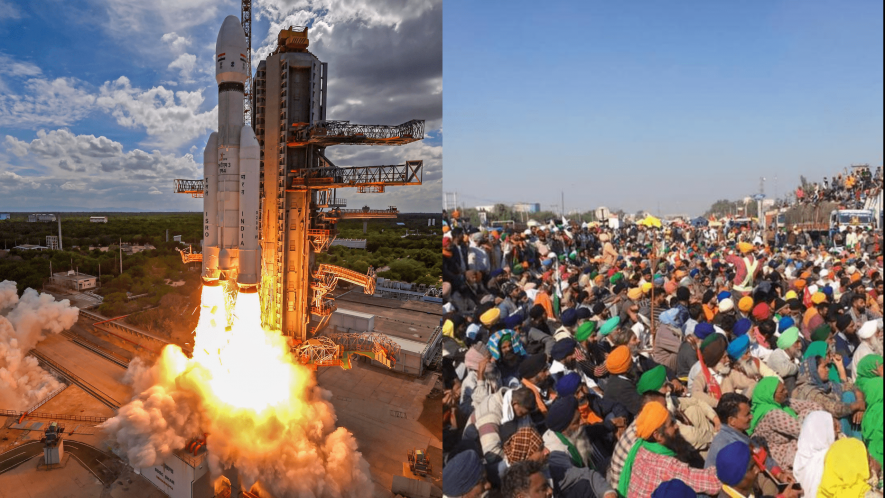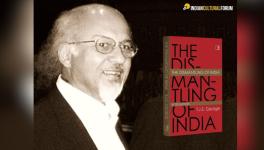Chandrayaan-3 Small Step, Farmers Protest Giant Leap for Mankind

ISRO's Launch Vehicle Mark-III (LVM3) M4 rocket carrying 'Chandrayaan-3' lifts off from the launch pad at Satish Dhawan Space Centre, in Sriharikota, Friday, July 14, 2023. Image Courtesy: PTI
In a limited way, the successful launch of Chandrayaan-3 on July 14 triggered an orgy of pride. Headlines like ‘Twitter Erupts in Pride as Chandrayaan-3 Launches’ or ‘The nation swelled with pride after hearing what ISRO chairman said’ were the order of the day.
Even headline grabbers, celebrities, were not far behind to cheer the nation’s ‘achievement’ although this assessment reeked of subjectivity: ‘Celebs Say It’s A Proud Moment For India’s Space Mission’.
Prime Minister Narendra Modi too predictably acclaimed that the “remarkable mission will carry the hopes and dreams of our nation”.
I do not wish to enter the debate on how significant this achievement is and if it is truly a moment to exude national pride. Several regimes in the past too have attempted to foist strides made in areas that did not make India an equal opportunities nation or where disparity was minimised as a matter of pride for every citizen.
Because of the nature of India’s moon mission and several other parallels, I was instinctively reminded of Satyajit Ray, specifically his 1970 masterpiece Pratidwandi and its famous interview scene. I wondered if Ray had been alive today or if anyone else would remake such a film, how the filmmaker and the entire team would script the conflict in the ‘interview’ between the harried job-seeker and a pompous board with layers of prejudice packed between the ears of the three middle-aged Bengali Bhadraloks (a remake may actually be situated anywhere in India and the interviewers may not necessarily be from West Bengal).
Instead of the three-member board asking the character of Siddharth, played by Dhritiman Chatterjee, about the most “outstanding and significant event over the past decade”, probably a different timeline could be set. So, instead of identifying an epochal event of the past 10 years, the board may well ask for the most significant development or episode in the past few years, maybe even post-2019, with this government’s re-election being the start of the ‘assessment’ period.
What then in your opinion has been the most important development within India in this period?
Basing my answer on Ray’s film, today’s Siddharth, in my mind would reply plainly: “I will have a tough time initially choosing between the anti-CAA stir and the farmer’s agitation against the farm laws but eventually I would probably settle for the latter because it was waged in more trying circumstances with death due to Covid staring the face of protestors every moment.”
Before continuing with the Pratidwandi 2.0 script, a quick recapitulation of the epochal sequence from the film is in order. However, a reminder of an important fact before that: the film walked away with three Indian national film awards, including the national film award for best direction in 1971 underscoring that in that era, quite unlike today, the State did not deny accolades to creative works despite it making profound and harsh political statements and criticism of the governments of the day.
Ray’s film was set in the late 1960s, when West Bengal was overwhelmed by political turbulence triggered by the escalating anger of unemployed youth. Ray’s protagonist, originally the character from Sunil Gangopadhyay’s novel of the same name, spends days flitting from one interview to another. Everywhere, waiting rooms are overflowing with jobseekers, some veteran and others who are in line to face the interview board for the first time.
The contemporary Siddharth, who has taken life in my mind, draws inspiration from the ‘original’, who pauses for exactly 10 seconds, during which only the rustle of a large and ancient ceiling fan in the room croaked into the silence, and then stated with self-assurance: “The war in Vietnam.”
“More significant than man landing on the moon?” asks the one, clearly the boss of the set-up, clearly establishing events depicted in the film took place after July 1969, when Neil Armstrong took “one small step for man, one giant leap for mankind”.
Siddharth’s explanation behind his decision to list the Vietnam War prior to the moon landing used the power of logic: “I think so,” he replies. And when asked to explain, he elaborates: “You see, we were not exactly unprepared for [the] moon landing. We knew it has to come about sometime, the advances in space technology...I won’t say it wasn’t a remarkable achievement but it wasn’t unpredictable...”
At that point, the second interviewer interjects to probe if the Vietnam War itself was unforeseen. Chatterjee humanistically contends while the war itself was not so, what was not expected was what the war revealed about the Vietnamese people. “About their extraordinary power of resistance, ordinary people, peasants and no one knew they had it in them...not technology but just plan human courage...and it takes your breath away...”
Likewise, Chandrayaan-3 was foreseen as a near infallible mission, at least, at the launch stage, especially after Chandrayaan-2 faltered at the last moment of landing on the moon. The success was on the cards as India has had an active space programme which, despite the present regime’s claims, was started in the Nehruvian era—although it got the ISRO name tag later.
Consequently, despite the bluster, the achievement is commendable but wears thin in the face of the Indian citizens’ indomitable spirit during the farmers’ stir even in the face of one of the most repressive regimes in the country’s history.
In Pratidwandi 2.0, the board will interrogate—was India’s successful and ‘free’ vaccine programme during COVID-19 not the most significant achievement? Or has not enhancement of izzat of the Indian passport been more important? And, the protagonist would remind that in the strictest sense, this was not ‘made in India’.
Moreover, mismanagement and anti-poor thrust of the government’s immediate handling of the crisis had greater negative impact than relatively less consequential successes. Also, the assessment that Indian travel documents are more respected is a mere yarn, and display of affection has to be seen more as payback for providing access to our market.
The concluding part of the interview sequence from Pratidwandi too has parallels in ample measure with events now. On hearing Siddharth’s answer about the unknown never-say-die spirit of the ordinary Vietnamese, the chief interviewer sucks air, takes a pause and asks offensively: “Are you a communist?”
When Siddharth retorts that one need not be a communist to admire Vietnam and its people, the boss dismissively counters: “That does not answer my question.” A moment later, the terse dismissal follows: “However, you may go.” I need not tell you whether Siddharth got that job or not. You would have guessed his failure in this mission but will acknowledge his success in making a point.
Pratidwandi was not the only film made based on events in India during the turbulent late 1960s and early ’70s, when policy failure, unbridled joblessness, economic stagnation, political violence, and rebellion and strife were met by unprecedented state brutality. Ray himself made two other films as part of his Calcutta trilogy and so did the other master from West Bengal—Mrinal Sen.
There were even mainstream films where the idiom of filmmaking was drawn from the commercial cinema as distinct from the art house genre that Ray, Sen and their likes followed although there too films often became commercially successful.
But among them, Apanjan and its Hindi remake Mere Apne stands out. Although seemingly a film on urban gang war and their interactions with an ageing and exploited woman who becomes an agent of reconciliation, the film was also about unemployed youth, their rudderless existence and frustration being vent on victims of the same policies.
In my mind, if Ray had to remake Pratidwandi in today’s India or if any other director would be redoing it now, she/he would do well to ‘borrow’ a song from director and lyricist Gulzar’s first directorial venture—Mere Apne.
In this, Siddharth would walk out from another failed interview and meet with jobless youngsters from Gulzar’s film and all of them would sing together the hit from the film while walking up to join a huge crowd, obviously protesting, the scene possibly resembling any of the borders where farmers protested during those tumultuous months that forced this government to its knees and announce the withdrawal of the farm bills. And, the lyrics need retelling although the song would be playing in the minds of countless:
हाल-चाल ठीक-ठाक है
सब कुछ ठीक-ठाक है
BA किया है
MA किया
लगता है वो भी
एँवे किया
काम नहीं है, वरना यहाँ – rpt (काम नहीं है, वरना यहाँ)
आपकी दुआ से सब ठीक-ठाक है – rpt (आपकी दुआ से सब ठीक-ठाक है)
हाल-चाल ठीक-ठाक है – rpt (हाल-चाल ठीक-ठाक है)
सब कुछ ठीक-ठाक है – rpt (सब कुछ ठीक-ठाक है )
आबो-हवा वा …वा
आबो-हवा देश की बहुत साफ़ है
कायदा है, क़ानून है, इंसाफ़ है
अल्लाह-मियाँ जाने कोई जिए या मरे
आदमी को ख़ून-वून सब माफ़ है………
The writer is an NCR-based author and journalist. His latest book is ‘The Demolition and the Verdict: Ayodhya’ and the ‘Project to Reconfigure India’. His other books include ‘The RSS: Icons of the Indian Right’ and ‘Narendra Modi: The Man, The Times’. He tweets at @NilanjanUdwin).
Get the latest reports & analysis with people's perspective on Protests, movements & deep analytical videos, discussions of the current affairs in your Telegram app. Subscribe to NewsClick's Telegram channel & get Real-Time updates on stories, as they get published on our website.
























